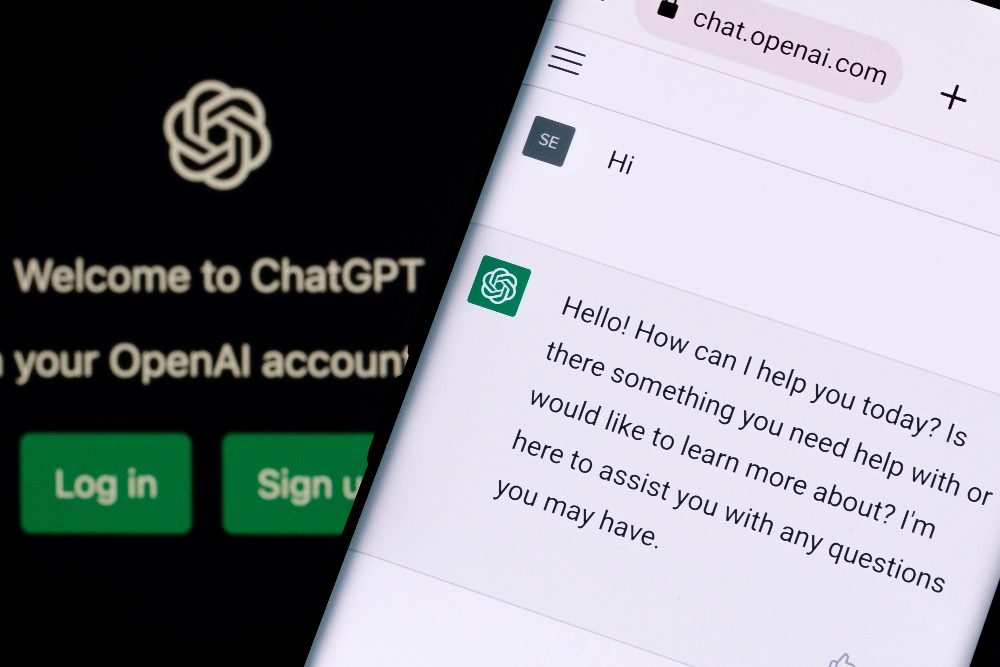The Gist
- From fun to work. ChatGPT, in just a year, evolved from entertaining AI to a significant tool in marketing and customer experience strategies.
- It ain't easy being ChatGPT. The AI chatbot faced challenges, including a major data breach and the temporary disabling of a key web browsing plugin.
- Who's your CEO? Leadership upheaval at OpenAI highlighted the complexities of managing cutting-edge AI developments.
Well, that was an interesting year.
OpenAI's ChatGPT, the generative artificial intelligence chatbot that changed the world of technology likely forever, debuted a year ago today. Nov. 30, 2022.
That day and the ensuing weeks after were fun. We asked ChatGPT to create songs for us. We asked ChatGPT to create fun work emails. We asked ChatGPT to create a rap battle between peanut butter and jelly. Wait, was that just me?
And we proudly shared on LinkedIn these ChatGPT outcomes, boasting about our early prompt-engineering prowess.
Then, things started getting real. We saw how valuable a tool like this could be for marketing and customer experience outcomes. We integrated it into our daily marketing campaigns and content creations.
Meanwhile, OpenAI and ChatGPT took generative AI to another level with platform developments. All the while, the world took notice, with global usage a real thing, and governments beginning to think about AI governance and world leaders meeting to create a safe and ethical world around AI as developments unleashed faster than ChatGPT writes marketing emails.
Yeah, we've come a long way since Peanut Butter called out Jelly in their famous rap battle. You're just Jelly, sweet and frail, Next to me, you're bound to fail.
So, without further ado, Happy Birthday, ChatGPT. We're going to celebrate by sharing CMSWire's top five stories around ChatGPT since its birthday last November.
a year ago tonight we were probably just sitting around the office putting the finishing touches on chatgpt before the next morning’s launch.
— Sam Altman (@sama) November 30, 2023
what a year it’s been…
1. How to Set up and Use the ChatGPT Web Browsing Plugin
No. 1 piece in Year 1 of ChatGPT? A Web Browser plugin.
In 2023, ChatGPT Plus significantly enhanced its capabilities, offering subscribers exclusive access to advanced features like web browsing and over 70 third-party plugins. This marked a pivotal upgrade from the initial release in November 2022, addressing a key limitation of ChatGPT's inability to access post-2021 data.
Subscribers were then able to enable the web browsing feature, allowing ChatGPT to fetch recent online data and provide up-to-date responses. The process to activate these features involved upgrading to ChatGPT Plus, adjusting settings, and turning on beta features. Additionally, users could leverage a variety of plugins for diverse applications, from creating videos with public stock footage to obtaining real-time market data. This expansion not only broadened ChatGPT's utility but also signified a significant step forward in integrating AI more deeply into daily digital interactions.
Related Article: ChatGPT Is All the Rage But Don't Stop Learning Just Yet
2. ChatGPT Suffers First Data Breach, Exposes Personal Information
In a significant development, OpenAI's ChatGPT experienced its first major data breach on March 20. The breach, which occurred during a system outage, compromised personal information of 1.2% of ChatGPT Plus subscribers active during a nine-hour period. Exposed data included names, email addresses, payment addresses, and partial credit card details.
OpenAI attributed the breach to a bug in an open-source library, which inadvertently allowed some users to view others' chat titles and the first message of new conversations. The incident raised critical concerns about data privacy in technology, mirroring wider industry issues, as exemplified by US Congress' scrutiny of TikTok's CEO.
OpenAI took several steps in response to the breach, including fixing the underlying bug, enhancing data matching checks, examining logs for data access inconsistencies, identifying and notifying affected users, and bolstering its systems to prevent similar occurrences. The company's commitment to user privacy and data security had been reaffirmed, though the incident underscored the ongoing challenges in safeguarding personal information in the digital age.
3. OpenAI Disables ChatGPT Bing Web Browser Plugin
On July 3, OpenAI disabled the "Browse with Bing" beta plugin for ChatGPT-4 due to issues with content display. This move was unexpected for many users over the July Fourth holiday weekend, especially since ChatGPT had become the fastest-growing app ever, largely benefiting from its ability to access internet-based sources for reliable and well-documented content.
The decision was attributed to the plugin occasionally displaying content in undesirable ways, such as inadvertently fulfilling requests for full text of URLs. OpenAI's action highlighted the challenges of integrating AI with web browsing, a combination that had significantly enhanced ChatGPT's capabilities. The integration of ChatGPT with Bing's web browser had represented a powerful union of AI and internet search, crucial for producing well-sourced answers.
However, the incident also underscored the experimental and uncertain nature of such beta features. Despite the temporary setback, OpenAI expressed gratitude for the feedback from ChatGPT Plus subscribers and committed to improving and reinstating the feature. This episode was a notable event in the evolving landscape of AI-driven customer experiences and digital content access.
Related Article: 6 Ways ChatGPT May Change Digital Customer Experience
4. ChatGPT Is Already Replacing Humans in the Workplace
A survey released by Resume Builder on Feb. 27 found that nearly half of U.S. companies using ChatGPT had replaced workers with the AI chatbot since its debut in November. This revelation challenged the notion that ChatGPT wouldn't replace humans in the workplace. The survey, involving 1,000 U.S. business leaders, indicated that 48% of the companies had used ChatGPT to replace employees, leading to significant cost savings.
Most companies (99%) reported saving money, with 48% saving over $50,000 and 11% saving more than $100,000. These figures highlighted the growing economic incentives for integrating ChatGPT into business operations.
Additionally, the survey predicted more ChatGPT-related layoffs, with 33% of business leaders foreseeing definite layoffs by the end of 2023 and 63% within five years. The use of ChatGPT extended to various tasks including writing code, content creation, customer support and drafting job descriptions.
Resume Builder's Chief Career Advisor Stacie Haller emphasized the need for employees and job seekers to adapt to these technological changes. The survey also found that 92% of business leaders viewed AI/chatbot experience as a plus for job candidates, with 90% favoring ChatGPT-specific experience. This survey underscored the rapid integration of ChatGPT in the workplace and its substantial impact on job roles and employment dynamics, suggesting a significant shift in skill requirements and job security in the face of advancing AI technology.
5. OpenAI Board Fires CEO Sam Altman
OpenAI underwent a dramatic leadership change when its board of directors fired CEO Sam Altman on Nov. 17, citing a loss of confidence in his candor with the board. This decision came just before the one-year anniversary of ChatGPT, an AI app that rapidly gained global recognition.
Following Altman's dismissal, OpenAI President and Co-Founder Greg Brockman and other executives resigned. Altman, who had been the face of OpenAI, was instrumental in the launch of ChatGPT and its subsequent updates, including GPT-4 Turbo. Despite his significant contributions, the board's deliberative review process concluded that Altman's lack of transparency hindered its governance.
In an unexpected turn of events, Microsoft hired Altman to lead a new advanced AI team, as reported on Nov. 20. However, by Nov. 22, OpenAI had rehired Altman, and the board underwent changes. Mira Murati, OpenAI's CTO, was appointed interim CEO during this period of upheaval. The OpenAI board, including key figures like Ilya Sutskever and Adam D’Angelo, expressed commitment to the company's mission, despite the turmoil. The incident raised questions about OpenAI's future development, particularly in the ethical and responsible advancement of AI.
We all know how it eventually turned out — Altman and Brockman ended up back at OpenAI under a new, developing board of directors. And, just yesterday, Nov. 29, they formally announced their renewed vision.
Happy Birthday, ChatGPT. Looking forward to see what you come up with in Year 2.

